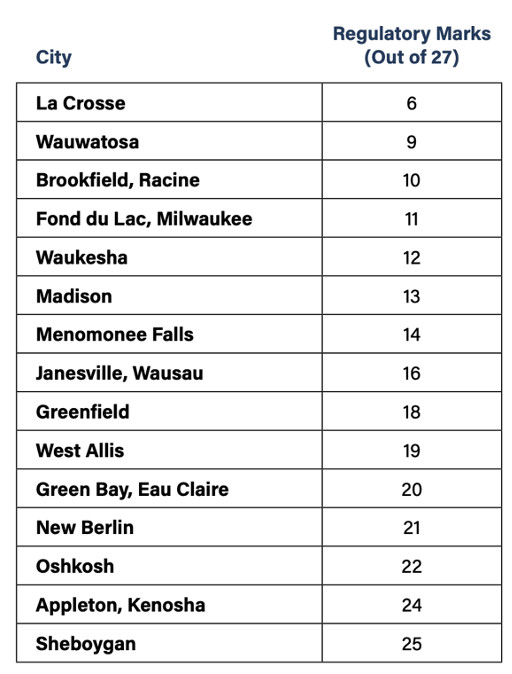Policy report shows local government strangling home-based businesses with red tape, hurting economic growth, and infringing on freedom
The News: The Wisconsin Institute for Law & Liberty (WILL) released its latest policy report, “Wisconsin: A Broken Home for Home-based Businesses.” The report highlights the bureaucratic nightmare of red tape facing home-based businesses, and lays out specific solutions to ensure Wisconsin is truly open for business.
The report analyzes relative burden of regulations on home-based businesses in the state’s 20 most populous communities. The rankings were calculated by analyzing the restrictions placed on home businesses by each of these cities’ complex zoning codes.
The Quote: WILL Writer and Research Analyst, Cori Petersen, says: “69% of businesses began in someone’s home, including some of today’s largest, most profitable companies like Apple, Amazon, and Google. Cities love to say that they are open to business, but if they have overly restrictive regulations that prevent our smallest of businesses from flourishing, then it’s time for a change.”
Background: The COVID-19 pandemic has brought lasting changes to the world’s economy; and from it, nearly 30% of the workforce voluntarily left their jobs in 2021. This “Great Resignation” led to a boom in entrepreneurship, with many workers taking control of their destinies and starting their own businesses, oftentimes in their own home. While some entrepreneurs treat these businesses as ways to supplement their income, many may grow into successful, full-time employers.
Yet, communities across the nation, and specifically in Wisconsin, have instituted lengthy lists of regulations that create barriers to people starting in-home businesses. Some regulations, specifically those that address major negative externalities like excessive sound and pollution in residential areas, may make sense. However, many of the rules on the books are arbitrary and unnecessarily burdensome.
Key Findings:
- COVID-19 brought about a huge increase in new business formations. In 2021 there were nearly 5.4 million new businesses, an increase of 23% from 2020 and 50% from 2019.
- 69% of all businesses are started in the home, including companies like Apple, Google, and Amazon. Furthermore, of the 32.5 million home-based businesses currently operating in the U.S., about half operate out of the home.
- Some local regulations would prevent many no-impact businesses from operating out of a home all together.
- For example, the following cities only allow items to be sold that were made on the home’s premises: Madison, Kenosha, Eau Claire, Waukesha, La Crosse, Sheboygan, New Berlin, Menomonee Falls, and Greenfield;
- Wausau, Brookfield, and Kenosha say businesses can have “no stock in trade,” which means people operating an at-home eBay business would likely be in violation of city ordinances;
- Wausau says there can be no sales on the premises, which could prohibit sales of items on popular sites like Facebook Marketplace;
- Menomonee Falls says no one can come or go at a residence for a home business.
- Regulations on home-based businesses are often unenforceable. Enforcement among cities is also inconsistent. Eliminating unenforced regulations would give greater certainty to home-based business owners, and make the system more just and fairer.
- Overly burdensome regulations on home-based business may infringe on a person’s “Right to Earn a Living.” It is well within the purview of state government to protect the individual rights of citizens against encroachments by other governmental entities.
- The volume and egregiousness of regulations on home-based businesses vary between cities. Among the top 20 populated cities in the state, Sheboygan is the most burdensome city, while La Crosse was the least burdensome.
See how your city stacks up:

Policy Recommendations: WILL offers several solutions for how both state and local policymakers can take steps to help cities become better homes for home-based businesses.
- Statewide Solutions: In recent years, states like Florida, Iowa, and Missouri have taken action to pre-empt overly burdensome local regulations on home-based businesses. A statewide pre-emption would prevent communities from imposing onerous regulations on home-based businesses that create no-impact on neighbors. This would replace a piecemeal and unfair approach to regulating home based businesses with a clear, consistent, and fairer approach.
- Local Solutions: Local governments should take actions to review their zoning code and ensure that they are not unnecessarily restricting home-based businesses from operating.

Cori Petersen
Writer and Research Analyst
